"We, too, could multiply loaves and fishes"
Inside: Catholic Workers offer perspectives on politics, Gaza, hope, and anxiety. Highlights from October events in Manhattan, Washington, D.C. and beyond.
The Politics of Voluntary Poverty
As November 5 grows closer, I’ve noticed a sharp uptick in mentions of Peter Maurin and Dorothy Day in essays on the election—in Catholic Worker publications, as we share below in Roundtable—but also in other secular and religious outlets. Many Americans clearly still find the Catholic Worker and its founders a resonant reference when pondering what faith-in-action in the political sphere looks like.
You can read a U.S. Catholic article on Dorothy Day and the Catholic Church’s varied stances toward women’s suffrage; a New Lines Magazine article describes the Catholic Worker’s stance against voting, along with other anarchist or peace churches. A North Dakota State University student publication encourages “fellow leftists” to follow Peter Maurin’s and Dorothy Day’s example of offline action rather than online doomscrolling. An author of an op-ed in the Pittsburgh Post-Gazette highlights Day’s spirituality of faithfulness rather than effectiveness. And Cameron Bellm, a writer based in Seattle, ponders the Catholic Worker motto (borrowed from the Industrial Workers of the World) to “build a new society in the shell of the old.”
And I get why folks look to the Catholic Worker for ideas.
After a decade of knowing Dorothy Day’s name and a distorted outline of her life (Communist, abortion, conversion, Mother Teresa of New York City, right?) I finally seriously began to study the Catholic Worker in 2020, after reading in John Loughery and Blythe Randolph’s biography of Dorothy Day that she had been imprisoned for marching for women’s suffrage but never cast a vote. It’s a striking juxtaposition. I wanted to know more. I wrote my first piece about the Catholic Worker as part of a journalism school assignment on the 2020 election.
But what impresses me more and more about both Dorothy Day and Peter Maurin as I grow older is their creative imaginations. They challenge our sense of what is possible. They are not locked, as so many of us are, into reactionary politics.
Dorothy asked a political question I find missing from the dozens of political flyers that arrive daily in the mail at St. Martin De Porres House here in Harrisbug, Pennsylvania. Dorothy asks: what will make the lives of the poor—our next door neighbors and those across the ocean—better? How do we not just offer salves to the slaves, but do away with slavery?
In a September 1974 column, Dorothy wrote of the importance of the “primacy of the spiritual.” If we believed it, she said, “we too could multiply loaves and fishes and save the world.”
Dorothy frequently invoked the “primacy of the spiritual.” But she didn’t mean a piety divorced from messy realities. As she writes in On Pilgrimage, 1948, leading with a human being’s spiritual dignity and supernatural needs translates into a more humane reality: “whether in the city or the country, in shop, office, field, factory or workshop.” In 1940, Dorothy highlighted cooperatives, credit unions, and communal farming as modes of organizing our economic and political worlds that correlate with each human’s spiritual dignity as a member of the mystical Body of Christ. One illustration of Dorothy’s ideas appeared in a recent New York Times article that discusses the politics of the rural poor who live in cashless economies. Among its interviewees were Miki Shiverick of the MVM Catholic Worker Farm in Bergholz, Ohio and Rebekah Grace Potts, a Catholic Worker who lives in Ypsilanti, Michigan. Ms. Potts, 52, highlighted the gift economy as part of the Catholic Worker’s philosophy:
“The Catholic Worker always barters for things,” Potts said. “It’s a mutual aid relationship that’s not formalized on paper; there aren’t tax forms for it.”
In 1953, Dorothy Day wrote: “The fundamental means of the Catholic Worker are voluntary poverty and manual labor, a spirit of detachment from all things, a sense of the primacy of the spiritual, which makes the rest easy.”
The primacy of the spiritual popped up again in Pope Francis’ newest encyclical, Dilexit Nos, on the Sacred Heart. This seemingly more spiritual letter is actually deeply related to the previous two documents he wrote about transforming our public—or political—realities, he says:
The present document can help us see that the teaching of the social Encyclicals Laudato Si’ and Fratelli Tutti is not unrelated to our encounter with the love of Jesus Christ. For it is by drinking of that same love that we become capable of forging bonds of fraternity, of recognizing the dignity of each human being, and of working together to care for our common home.
As I read through the pope’s encyclical, particularly in this month of all saints and all souls—a month of particular remembrance for many Catholic Workers, as the month in which Dorothy Day was both born and died—I thought of Dorothy’s life of love for God and neighbor. (I’m not the only one who finds deep resonances between Pope Francis and Dorothy Day: Robert Ellsberg writes about their connection in U.S. Catholic.)
Who would fight the dominion of war and violence and the supremacy of greed with voluntary poverty? At face value, this is a ridiculous idea. Certainly, no candidate on any ballot is preaching this Gospel. You won’t see any ads on tv for voluntary poverty and the primacy of the spiritual. But Dorothy’s life advertises their power. She offers a mystery to grapple and experiment with.
The co-founders of the Catholic Worker movement continue to ask us: what world could be possible if we, like Dorothy, kept close to mind the challenging words of Leon Bloy: “The only real sadness, the only real failure, the only great tragedy in life, is not to become a saint”? In this month of all saints, we are reminded of what sort of creative lives are possible if we live on fire with the love of God as Dorothy and Peter did, and how that sort of love can multiply loaves and fishes—and even change the world.
peace,
Renée
FEATURED
Group Provides Direct Support to Gazan Community, Bypassing Formal Aid Routes
What if people in affluent countries were able to provide cash assistance—and emotional support—directly to people under siege in Gaza?
That’s the basic idea behind an initiative being proposed to the Catholic Worker community by Garry Jones, an Irish musician and composer, with the support of his wife, Kate Hennessy. (Hennessy is a writer and the granddaughter of Dorothy Day.)
Jones got the idea after connecting with Yusuf El-Mbayed, a Palestinian poet and journalist based in northern Gaza, who works with a team of young Gazans to deliver critical aid to Gazans suffering from deprivation and conflict.
“Our major projects have been building eight toilets in the northern Gaza Strip for the homeless community to give them access to basic sanitary amenities,” El-Mbayed shared in a recent appeal letter. He and his team aim to provide clean water, food, and small comforts for children and families, from toys and fresh fruit to planned “pastry days” to bring hope amid hardship.
Jones connected with El-Mbayed through a friend, Vermont-based videographer Michael Hanish. Hanish had been helping El-Mbayed raise funds for his 10-year-old nephew, Hamood, who lost a leg and his whole family in an Israeli rocket attack.
“The idea of connecting specific groups in the affluent countries with specific communities in Gaza came about after I had been video chatting with Yusuf in north Gaza and developed a relationship with him and his neighbours that has become very important to me,” Jones wrote in a recent email to Roundtable. “Yusuf is such an amazing young man! He is a source of constant inspiration for me, as is his community. They are living in unbelievably terrible conditions, constantly living with the threat of annihilation, and still they maintain their dignity, humour, and sense of beauty. I know if others can develop a relationship in this way, some long-lasting and special connections will be made.”
Jones has created a Gaza Relief Crowdfunding Page on iDonate for the purpose of helping to raise money for El-Mbayed’s efforts. Donations get to Gaza through “an improvised digital pipeline,” according to Jones, because the lack of infrastructure, security, and functioning institutions have constrained traditional aid channels.
Now, Jones hopes this initiative spawns a longer-term support model in which affluent western communities are directly connected to communities in Gaza in a sort of sister-city program.
“I want to help form real, ongoing, lasting relationships between these groups, like what we do already [in Ireland] with the Twin Towns program, only far more important and immediate,” he said. “If any readers want to investigate setting up their own support group, please feel free to contact me at garryjones365@hotmail.com and I will help any way that I can.”
Read a longer version of this article, as well as the full text of letters written by Jones and El-Mbayed, at CatholicWorker.org.
What Does Hope Look Like Amid the Rise of Christofascism?
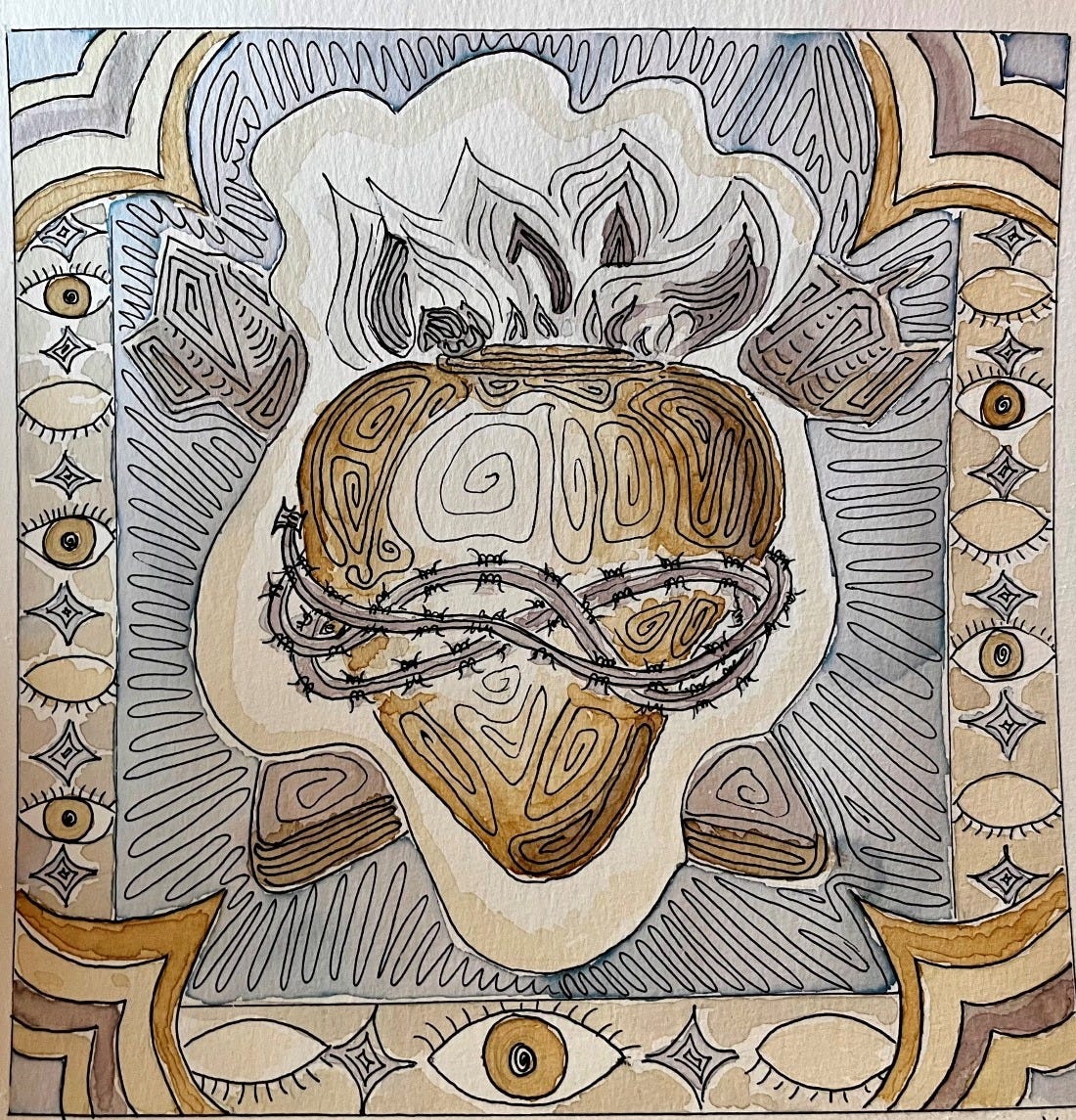
“There is much talk about the rise of Christofascism in our country; but how do people sustain themselves in the struggle against it?”
This is the question Claire Lewandowski poses in an essay for the October Catholic Agitator. Drawing on the work of Polish poet Zbigniew Herbert—”a Polish writer whose searing poems were informed by his experiences living under Nazi and then Soviet occupation in his war-torn home country”—Lewandowski unpacks her own “spiritual knapsack” – the essentials that keep her putting one foot in front of the other, even when things look hopeless. Here’s an excerpt:
At last week’s house liturgy I found myself thinking about despair. We were discussing the seventh chapter of Mark’s Gospel, where Jesus challenges the morality of the day by telling his disciples that it is not what comes from outside that harms a person, but rather the sin that rises up from inside a person that defiles. He goes on to name a multitude of evil spirits: anger, greed, licentiousness, pride.
I thought back through my young adulthood, my childhood, and only saw one great big smear of anxiety, all the difficult moments of my life clouded over by a kind of pervasive hopelessness. Where is there room for the anxious sinner, I asked God in that moment, the person whose primary sin is not wrath but despair?
Zbigniew Herbert was a Polish writer whose searing poems were informed by his experiences living under Nazi and then Soviet occupation in his war-torn home country. In my favorite of his poems, “The Envoy of Mr. Cogito,” he exhorts the reader again and again to continue on in the face of insurmountable cruelty, not because any hope is promised, but because “you have survived not so that you might live/you have little time you must give testimony.”
I have not yet encountered anyone else who has written about despair with such stubbornness, such knowledge of the long odds. His lack of romanticism feels especially needed in this time. There is much talk about the rise of Christofascism in our country; but how do people sustain themselves in the struggle against it?
You can read the rest of her essay at CatholicWorker.org: Rise and Go: A Spiritual Knapsack for the Times.
More CW Voices on the 2024 Vote
Two weeks ago, we featured Matt Harper’s essay on whether Catholic Workers ought to vote in the upcoming election, given the movement’s anarchistic foundations and its founder’s example. This week, we add a few more Catholic Worker voices to the conversation.
The lead article in the October-November edition of The Catholic Worker, out this week, is Liam Myers’s essay reflecting on the Catholic Worker’s legacy of constructing relationships of solidarity and mutual aid outside the bounds of partisan power structures. Using witnesses in the Catholic Worker tradition as well as the Parable of the Talents, Myers urges us to “reject this false joy that Harris is inviting us into, a joy that is complicit in the exploitation and bombing of others.” Here’s an excerpt:
Dorothy Day, who went to jail for protesting for women’s suffrage, never voted in a national election, and today many Catholic Workers and those inspired by her witness follow in her footsteps. She reminds us of the importance of local grassroots efforts. Dorothy reportedly said, “An individual can march for peace or vote for peace and can have, perhaps, some small influence on global concerns… If peace is to be built, it must start with the individual. It is built brick by brick.” Ultimately, when considering the work we have to do, it matters very little who wins this national presidential election. As Catholic Workers we know that our task is to stand against the crowd in a refusal to participate with the status quo as we strive to live the Works of Mercy. For some, this will mean voting against the threat of fascism while for others it will mean abstaining from the system completely.
You can read the entire essay at CatholicWorker.org. (And you’ll find a summary of the latest edition of The Catholic Worker in the Roundup below.)
A few hours after we posted Liam’s article to the CatholicWorker.org website, we received a letter from John O’Neill, a former member of the New York Catholic Worker in the 1970s, with another take on the issue:
The US bishops and Catholic social teaching instruct us that we need to participate in civic life. This is not a command to vote, but voting is one way that we can participate in public life.
I have few illusions about either major party and the candidates. Having said that, I believe that we have a positive duty to mitigate evil. I think that there's no question that Donald Trump will cause more harm than Kamila Harris. Support for Israel will not change. Modernization of our nuclear weapons will not change. But Trump will certainly do much to make our country worse.
He continues:
An example of how voting can be a positive good or at least mitigate evil is the election of 2000: Al Gore almost certainly would not have gone to war against Iraq. At least one of our two decade long wars would have been averted. A response to global warming would also have been undertaken.
You can read his full letter here.
We’re curious about our readers’ opinions. Feel free to cast a vote in our poll below:
THE ROUNDUP
Boylan Goes Viral on Instagram with Call for Pope to Go to Gaza. Kathy Boylan’s call for the pope to go to Gaza has gone viral on Instagram. The news outlet TRTWorld interviewed Boylan as she stood in front of St. Patrick’s Cathedral with a sign urging the pope to go to Gaza. “The Pope knows that God has commanded us not to kill. Killing on a genocidal level is going on in Gaza. The Pope has to denounce it, has to be with the victims,” Boylan says in the video, which has received more than 18,000 likes. See the video on Instagram.
A Roundup of the Oct-Nov issue of The Catholic Worker. The latest issue of The Catholic Worker is out, with lead articles from Liam Myers on the 2024 vote (see above) and Renée Roden on the National Eucharistic Congress. Chris Haw remembers Fr. Michael Doyle (1934—2022) for his decades-long dedication to social justice among the marginalized communities of Camden, New Jersey. In "Flow of US Arms Continues," Kathy Kelly describes her participation in a recent week of action at the United Nations, during which she joined a coalition that met with representatives from twelve different UN member countries. The coalition’s goal was to press for the enforcement of international laws, such as the Genocide Convention and the Geneva Conventions, to address and prevent acts of genocide, particularly in Gaza. “An Offense Against God” is adapted from a speech by Gloria Purvis at the National Eucharistic Congress; in it, she emphasizes that racism is a sin that attacks the unity of the human family, and she calls on Christians to atone for and actively work against this sin. And on the back page, Patrick Jordan marks the centennial of Commonweal magazine with a reflection on its long relationship with the Catholic Worker Movement. (Jordan served as an editor for both Commonweal and The Catholic Worker.)
The Deep Causes of Christian Nationalism. A new book by one of the co-founders of the Maurin Academy for Regenerative Studies argues that “Christian nationalism and other ideological extremes are symptoms of major economic, technological, spiritual, and psychological shifts that have left too many people uprooted, disenchanted, and precarious.” In The Gap in God’s Country: A Longer View on Our Culture Wars, out October 23 from Wipf and Stock, author Laurie M. Johnson proposes that Christian communities, oriented around principles of mutual aid rather than political or economic self-interest, can help heal ideological rifts by modeling an alternative to the atomized, competitive nature of modern society. Read an excerpt from the Introduction at the Maurin Academy website, watch the author discuss her approach to the book on YouTube, and preview the beginning of the book at Amazon.
The Sower Remembers Cliff Lichter. The fiftieth issue of The Sower, newsletter of Strangers and Guests Catholic Worker in Maloy, Iowa, features a long remembrance of Cliff Lichter, who passed away in July. Btian Terrell remembers Lichter as a “wandering Catholic Worker pilgrim.” Download and read the entire issue at CatholicWorker.org.
How the Ignatian Spiritual Exercises Can Help Us Confront Structural Racism. “How might an Ignatian-inflected view of the Gospel help social activists in their confrontation with racism?” This is the question that Roger Haight, S.J., an emeritus visiting professor at Union Theological Seminary in New York, uses as a starting point for his proposal that “the Spiritual Exercises of St. Ignatius Loyola have a structure which forms a counterpoint to racism.” The talk he gave at Maryhouse Catholic Worker in November 2023 has now been adapted into an article that you can read at America magazine.
Ritualizing Death at the L.A. CW. “Through my decadeslong tenure at the Los Angeles Catholic Worker, I have learned more about death than I ever imagined I would,” Jeff Dietrich writes in an essay for the National Catholic Reporter. “Many have died at our house from Skid Row and from the AIDS community, guests and community members alike. We became a team of ‘death coaches,’ accompanying these individuals through the final passage into the next phase of life. We have found that community, ritual and prayer help us all be more familiar with death as a part of life, and to be more comfortable with our own inevitable death, which is as natural as being born.” Read Día de los Muertos at the Catholic Worker at the National Catholic Reporter.
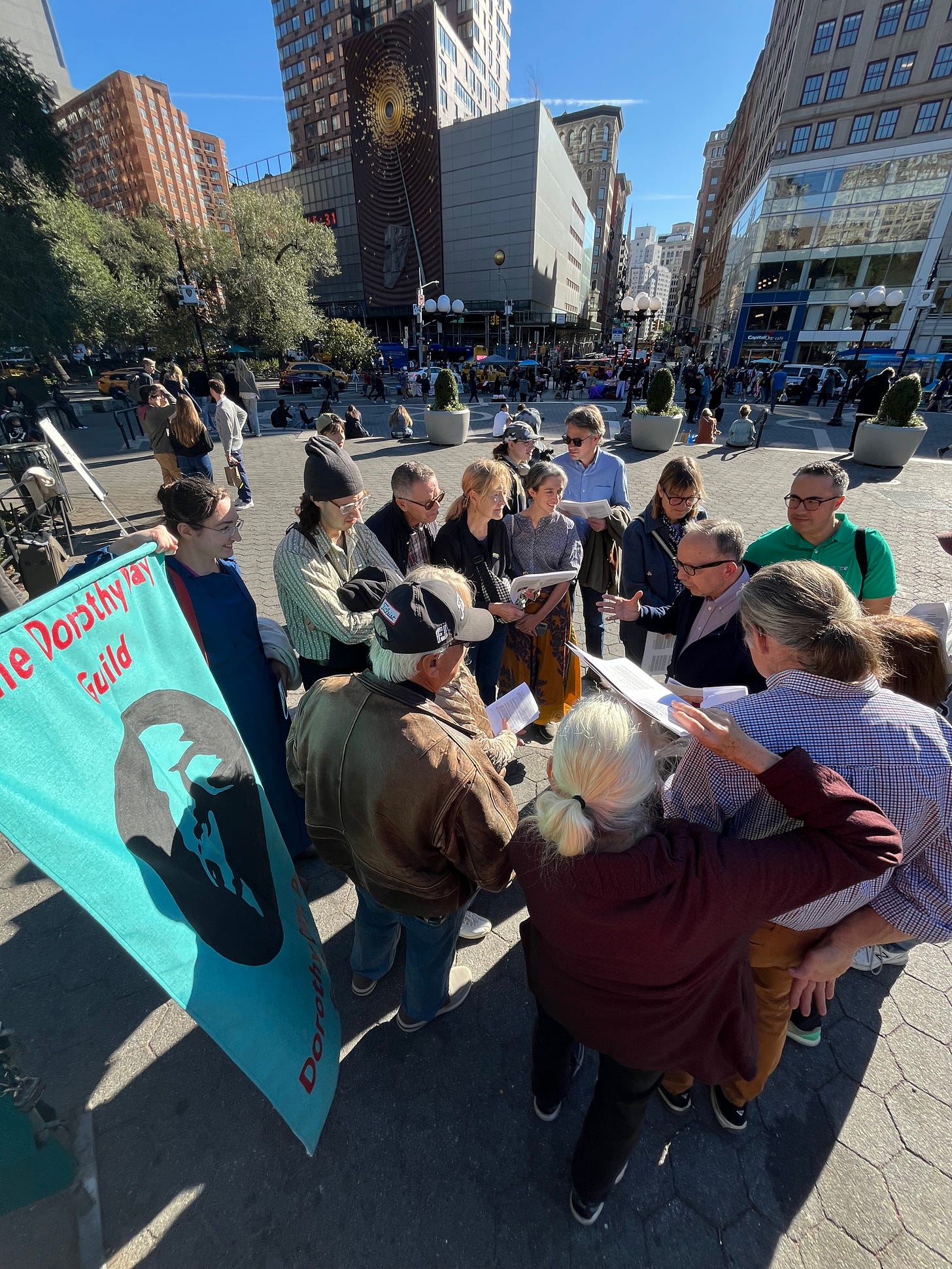
Mark Your Calendars:
Craft Retreat Set for February 13-18. Strangers and Guests Catholic Worker (Maloy, Iowa) will host a winter Craft Retreat from February 13-18, 2024, inviting participants to engage in weaving, basketry, spinning, baking, candle making, singing, and storytelling. The retreat’s schedule will be shaped around attendees' interests, offering opportunities to try their hand at weaving projects, including rag rug making on one of two looms. While the retreat is free, donations are welcome to help cover expenses. For details, contact Betsy at Strangers and Guests Catholic Worker.
A FEW GOOD WORDS
“On Pilgrimage” by Dorothy Day
“A deep, abiding joy can only be ours if we emphasize the ‘primacy of the spiritual,’ a phrase which Peter Maurin loved. We must grow in faith, in our spiritual capacity to ‘do all things in Him who strengthens us,’ even change the social order so that wars will cease and it will be easier to be good, to keep our sanity, be whole men, holy men, and truly love one another. If men can walk on the moon, why not?
If we were followers of Jesus, we too could multiply loaves and fishes and save the world.”
Roundtable covers the Catholic Worker Movement. This week’s Roundtable was produced by Jerry Windley-Daoust and Renée Roden.
Roundtable is an independent publication not associated with the New York Catholic Worker or The Catholic Worker newspaper. Send inquiries to roundtable@catholicworker.org.


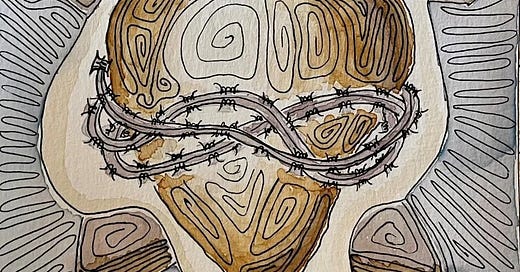



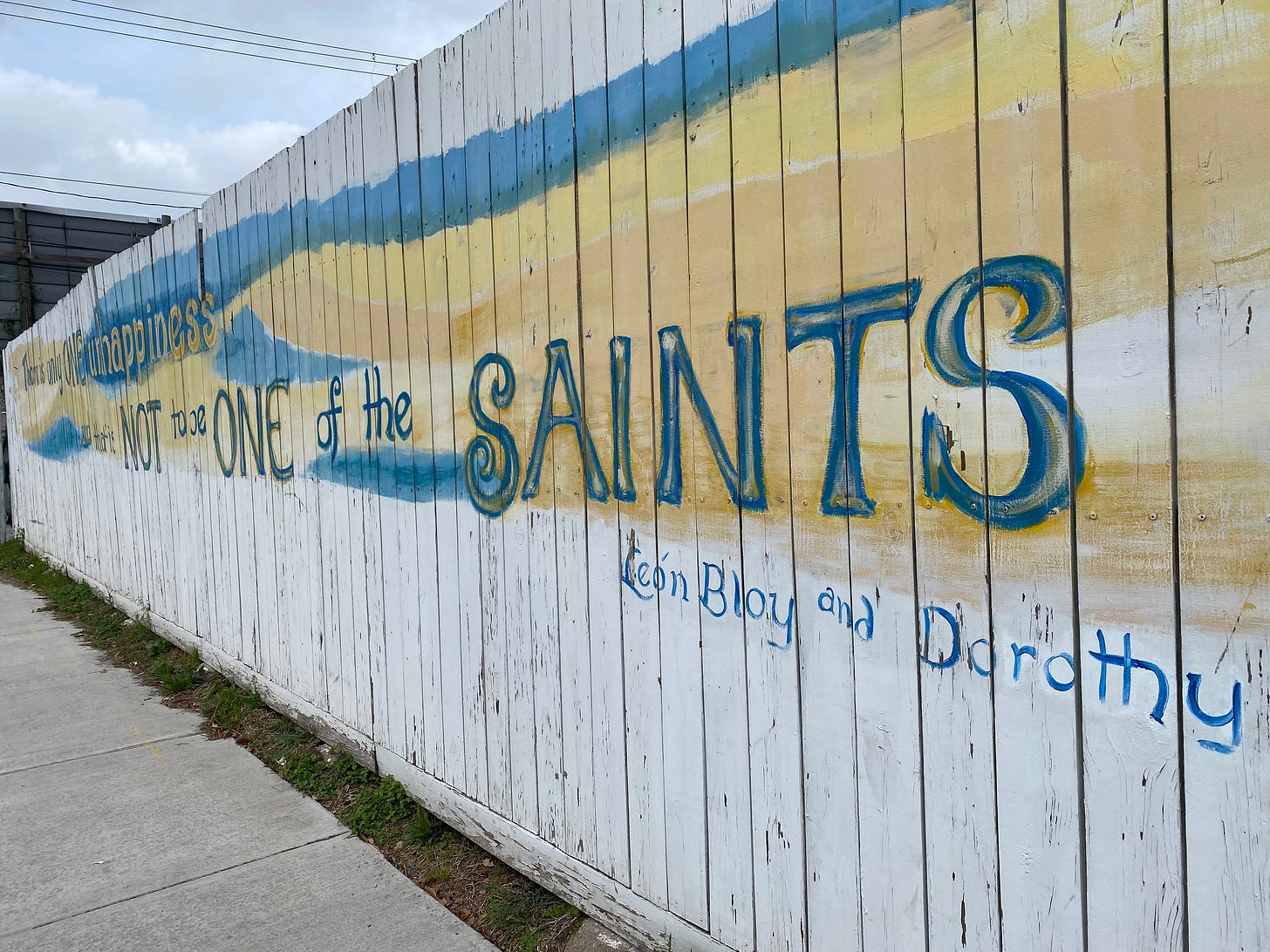
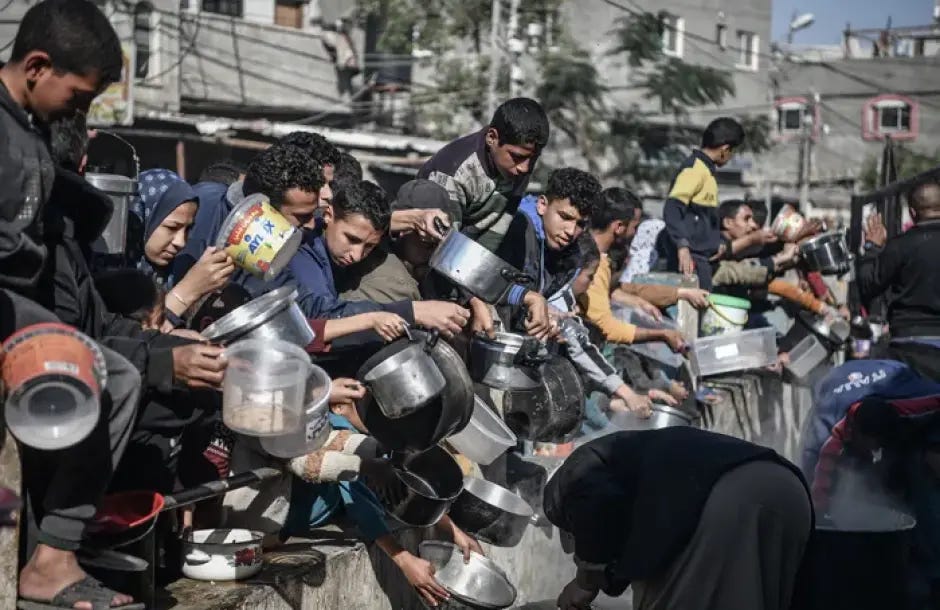


solidarity forever ❤️🔥